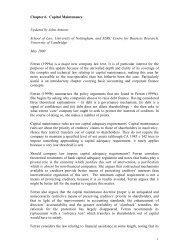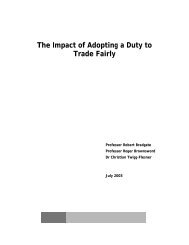From Exuberant Youth to Sustainable Maturity - DTI Home
From Exuberant Youth to Sustainable Maturity - DTI Home
From Exuberant Youth to Sustainable Maturity - DTI Home
You also want an ePaper? Increase the reach of your titles
YUMPU automatically turns print PDFs into web optimized ePapers that Google loves.
Poor press and perception of games - 'violent,<br />
'antisocial', 'waste of time'<br />
This is an important issue for the industry as a whole<br />
and something that ELSPA has been active in<br />
addressing. Video games have been subject <strong>to</strong><br />
negative press for many years with accusations of<br />
violence in games engendering real violence and<br />
more general suggestions that playing video games<br />
is low on the pecking order of entertainment<br />
activities. There is mixed opinion about whether this<br />
is a key issue for the industry. Most interviewees<br />
were concerned about the perception that video<br />
games are inferior pastimes <strong>to</strong> film and TV. This<br />
concern ties in with the general opinion that the<br />
games industry needs championing and profile<br />
raising at every level.<br />
Perception of the industry as not offering serious<br />
career potential<br />
The UK games industry has its roots in the<br />
programming enthusiasts who made full use of the<br />
early Sinclair Spectrum computers. This gave the<br />
industry a "hobbyist" culture, which has persisted <strong>to</strong><br />
this day, and <strong>to</strong> some extent gives the industry a<br />
reputation for not being able <strong>to</strong> offer structured<br />
career opportunities. There is certainly a lack of a<br />
clearly defined career path for people who enter the<br />
industry, as has been established for film and TV.<br />
This issue is discussed further in the skills section<br />
below.<br />
3.5.2 Access <strong>to</strong> finance<br />
UK financial community has a limited<br />
understanding of the nature of the games<br />
industry<br />
The exploitation of IP is the key <strong>to</strong> the development<br />
of cash flows by which both developers and<br />
publishers can invest in future growth. However, in<br />
order <strong>to</strong> fund development and <strong>to</strong> build IP ownership<br />
(discussed below), significant investment is required.<br />
Beyond investment from within the industry, or<br />
government bodies, the main options for financing<br />
growth centre on the financial community:<br />
• Private equity - venture capital, business angels<br />
• Public equity - including AIM for smaller<br />
companies<br />
• Banks - loans, guaranteed loans, completion<br />
bonding<br />
32 Source: Spectrum games industry interviews<br />
UK COMPETITIVENESS SUMMARY<br />
Both developers and publishers have his<strong>to</strong>rically had<br />
difficulty communicating with and gaining the support<br />
of the financial community. There are only a few<br />
publicly listed companies in the UK <strong>to</strong>day - e.g.<br />
Eidos, SCi, Argonaut, Bits or Warthog. Some, such<br />
as Codemasters, have attempted flotation but<br />
encountered difficulties in doing so. More are wary<br />
of floating because of the additional work and<br />
maintenance required <strong>to</strong> keep shareholders happy.<br />
"I have considered it, but wouldn't do it. It takes up<br />
so much time in meetings and paperwork that you<br />
can't run the business anymore" [Established<br />
developer]<br />
Private equity funding is also difficult <strong>to</strong> secure. The<br />
UK has few business angels, many of whom are<br />
more likely <strong>to</strong> invest in film than games due <strong>to</strong> the<br />
former's higher profile and industry-specific tax<br />
allowances. Venture capitalists have limited interest<br />
in funding games companies because the investment<br />
required typically falls below their minimum<br />
thresholds. For example, Argonaut's early £2.4m VC<br />
funding in 1996 was well below APAX's standard<br />
threshold of £5m 32 . Other companies interviewed<br />
had been forced <strong>to</strong> find alternatives <strong>to</strong> VC funding for<br />
this reason.<br />
Another fac<strong>to</strong>r that discourages private equity is the<br />
lack of a clear exit route for the inves<strong>to</strong>r, due largely<br />
<strong>to</strong> the problems that the games industry has in<br />
tapping public equity markets. The only alternative<br />
exit option for a private inves<strong>to</strong>r is therefore<br />
acquisition by a larger player.<br />
The key concern is that the financial institutions<br />
frequently do not have a sufficiently developed<br />
understanding of the nature of the industry <strong>to</strong> enable<br />
them <strong>to</strong> judge what is or is not a sound investment.<br />
Those that have considered raising money through<br />
the city have received poor reactions for the following<br />
reasons:<br />
• There are very few brokers specialising in the<br />
games industry. Most institutions still group<br />
games with other software or entertainment<br />
products, so there is limited understanding of the<br />
idiosyncrasies of the industry<br />
Competitiveness analysis of the UK games software sec<strong>to</strong>r Main report 25
















